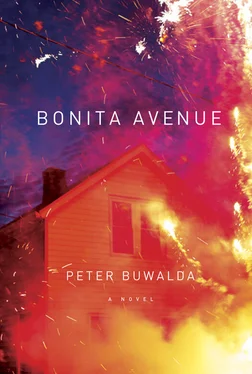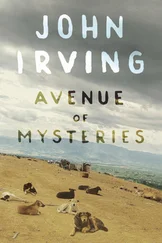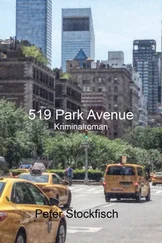He walked back by the light of the fluorescent tubes, teeth chattering, following his own footprints that showed up as dark shadows against the illuminated snow, and crouched down next to the body. His toes were already numb; these must be the coldest hours of the night. Illuminated by the outdoor lamp the face looked surreal, it was the color of newsprint, the blood under the nose was black.
Never drag a dead body. Crime shows are a turn-off, he avoids watching reconstructions of murders and rapes, and yet somewhere he’s learned that drag marks are the worst. He planted his feet perpendicular to the body and squatted down. The smell of rum, and something musty — he put his revulsion aside, wriggled one arm under the shoulders, the other under the thighs. A wet chill had soaked through his woolen gloves. He tried to straighten up, a sharp pain shot through his bruised rib cage. The load came loose from the snow, but behaved in a way he did not expect: instead of giving in the knee joints and midriff — as a sleeping daughter does when you carry her from the backseat of the car to the house, up the stairs, and into bed — the body resisted gravity like a railroad tie. Its center of gravity was in a strange place, he had misjudged it: the legs, stiff as boards, sloped toward the ground; he had to squat down again to keep from losing his balance, the corpse’s heels landing in the snow with a thud, he slid forward anyway, banged his knees against the leather jacket. It felt hard underneath, as though he’d fallen onto a rock in a river.
The second attempt went better, although the outstretched hulk was heavier than he had expected. Treading cautiously, he carried it to the workshop, had to turn it sideways to get it in. He went to the middle of the concrete floor, turned hesitantly around, and even before deciding to hide the body behind the veneer press after all, he knew he had made a mistake.
How could you be so stupid? How could you be so stupid as to lug a dead body around? The realization of what he was facing made him dizzy, he had to sit down. How logical it would be to pin it on him, to suspect him of murder. The obvious assumption that he had deliberately dumped Wilbert out in the cold. He staggered over to the band saw, a kind of overgrown sewing machine, and slumped down onto the leather seat attached to it. Through the eyes of the prosecutor he saw himself hoist the unconscious, wounded body into a fireman’s lift and carry it into the backyard, the motives fluttering out of his sleeves like playing cards. A frozen stiff with a torn-off arm? And then drag it into the shed? Why? He didn’t have a leg to stand on. On top of it, that is how it was . He did abandon Wilbert to his fate. He knowingly let him die. He laid his head in his hands and stared at the blood spatters on the cement floor.
The corpse had to go. Dispose of the body . As he fingered the wound on his chin the stupid ideas came, the easy, obvious solutions that were everything but solutions. Bury it behind the workshop, in the weedy bit where the kids used to have their vegetable patch. Yeah, and spend the rest of his life next to his son’s grave? He squeezed his chin in anger, the pain was gratifying, the wound oozed fluid along his stubbly neck. Then it came to him: the Rutbeek, of course, the Rutbeek . It would be dark for another few hours, he could weigh down the body, drive out to the lake, and dump it. He pounded his knee from the stupidity of it all. You can’t just go driving around with a corpse . He shouldn’t have touched it in the first place. Dump a dead body in a recreational area? Damn it, people skated on the Rutbeek.
Keep on walking. The first time he looks back, the Audi seems far off, a barely visible silver speck beyond a tangle of branches and tree trunks. And him? Does he stand out in his bright red coat? Do the Walloons come here? Of course they do. One day they will. And where will he be that day? It feels like the tent bag is hanging by hooks on his ribs. Keep walking. Despite the pain he sees it before him; he must not think of that mug. Feel the moist splinters on your lips, on your forehead . Fifty heavy meters into the woods, the ground suddenly slopes downward. He is standing on the edge of a sort of pit, a hollow several meters deep. At the bottom, bird footprints dot the snow. At the ridge of the cavity he sees a large pine tree, leaning forward as though taken by surprise as the ground gives way at its feet: the wreath of roots hangs half over the edge. He descends, his back to the pit, with a few cautious, slipping steps, and glances under the roots. Yes, there’s enough room. A hollow to stuff his conscience in.
First he went to fetch the bags. He had ordered himself back into the farmhouse and walked upstairs. The bathroom door was open, the small fluorescent light was on. Muddy feet on the green tiles; in the toilet a wad of tissue floating in an oval of urine. He gave the flush knob a smack and went into Joni’s old room. The pink curtains were drawn. He smelled something sourish-sweet, but refused to consider the notion that the bastard had been in here too. At the bottom of her wardrobe he found his old backpack, the one he took to gymnastics camp and on InterRail vacations as a teenager. One door farther, in his study, he removed a hatch where they stored the camping gear; stretched out on his belly, he reached through the dust and pulled out a dark-red oblong bag holding a family-size tent, shook out the ground cloth, the moth-eaten canvas flysheet, and the poles. With both bags under his arm, he went back downstairs, took a roll of garbage bags out of a kitchen drawer, went back across the yard, and laid it all out on the long workbench in the shed.
In the hard light of the work lamps he went over to a blue steel rack holding about twenty planks of wood, all different sorts, waiting to be planed, whittled, or sawed. Flaky wood, a kind of chipboard, a fibrous, absorbent plank. He took a sheet of pressed sawdust the size of a double door off the rack and carried it, wincing from the pain, over to the table. How did Tineke do this again? He rested the sheet against the workbench and nudged the adjustable rip fence made of green hammered steel, picked up the sheet of wood and laid it onto the frame just as he’d seen her do. The purposefulness of his actions made him think of the way he could pack a suitcase following an argument: demonstratively, decidedly, but not believing for a minute that he would actually leave.
He walked around behind the veneer press and studied the contorted, rigid body lying on the floor. Was it still cooling off? Did it freeze all the way through? Could a person freeze solid in six hours? What would he do if—
There were no “ifs” anymore . He squatted down next to the body, his knuckles against the concrete, and lifted it up for the second time. Ignoring the shooting pain in his ribs, he released it with a bonk onto the chipboard. With some joggling and prodding — the load was on the heavy side, the squeak of the bearings told him — he managed to roll the horizontal surface so that the saw was at right angles to the left hip. He went over to the long workbench and found a roll of silver duct tape in a plastic bin. With long, gummy lengths of tape he fastened the corpse in various places to the wood.
For the first time he saw it close up and fully lit: the lopsided white sneakers, laces double-knotted; the blood-spattered jeans; the battered face — the pleb-face that Koperslager had warned him about all those years ago — and yet: his features. The congealed blood stuck like caviar to the cracked lips. The edge of his ears, the flat boxer’s nose, the right cheek — black and wrinkled as prunes. The right eye was open. A smog of alcohol still wafted out of the twisted mouth. The fingertips of the visible hand were black too, the withered pinky resembled a burned match.
Читать дальше












